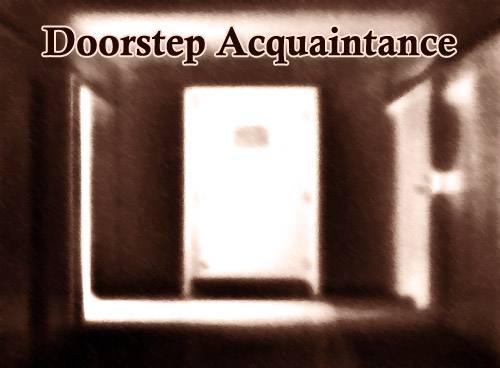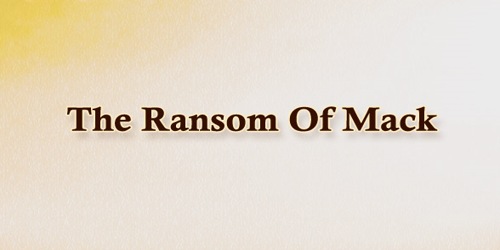Vagabonds the world would no doubt call many of my doorstep acquaintance, and I do not attempt to defend them all together against the world, which paints but black and white and in general terms. Yet I would fain veil what is only half-truth under another name, for I know that the service of their Gay Science is not one of such disgraceful ease as we associate with ideas of vagrancy, though I must own that they lead the life they do because they love it. They always protest that nothing but their ignorance of our tongue prevents them from practicing some mechanical trade. “What work could be harder,” they ask, “than carrying this organ about all day?” but while I answer with honesty that nothing can be more irksome, I feel that they only pretend a disgust with it and that they really like organ-grinding, if for no other reason than that they are the children of the summer, and it takes them into the beloved open weather. One of my friends, at least, who in the warmer months is to all appearance a blithesome troubadour, living
“A merry life in sun and shade,”
as a coal-heaver in winter; and though this more honorable and useful occupation is doubtless open to him the whole year round, yet he does not devote himself to it, but prefers with the expanding spring to lay aside his grimy basket, and, shouldering his organ, to quit the dismal wharves and carts and cellars, and to wander forth into the suburbs, with his lazy, soft-eyed boy at his heels, who does nothing with his tambourine but take up a collection, and who, meeting me the other day in a chance passage of Ferry Street, knew me, and gave me so much of his father’s personal history.
It was winter even there in Ferry Street, in which so many Italians live that one might think to find it under a softer sky and in a gentler air, and which I had always figured in a wide unlikeness to all other streets in Boston, with houses stuccoed outside, and with gratings at their ground-floor windows; with moldering archways between the buildings, and at the corners feeble lamps glimmering before pictures of the Madonna; with weather-beaten shutters flapping overhead, and many balconies from which hung the linen swathings of young infants, and love-making maidens furtively lured the velvet-jacketed, leisurely youth below: a place haunted by windy voices of blessing and cursing, with the perpetual clack of wooden-heeled shoes upon the stones, and what perfume from the blossom of vines and almond-trees, mingling with less delicate smells, the traveled reader pleases to imagine. I do not say that I found Ferry Street actually different from this vision in most respects; but as for the vines and almond-trees, they were not in bloom at the moment of my encounter with the little tambourine-boy. As we stood and talked, the snow fell as heavily and thickly around us as elsewhere in Boston. With a vague pain, the envy of a race toward another born to a happier clime, I heard from him that his whole family was going back to Italy in a month. The father had, at last, got together money enough, and the mother, who had long been an invalid, must be taken home; and, so far as I know, the population of Ferry Street exists but in the hope of a return, soon or late, to the native or the ancestral land.
More than one of my doorstep acquaintance, in fact, seemed to have no other stock in trade than this fond desire and to thrive with it in our sympathetic community. It is scarcely possible but the reader has met the widow of Giovanni Cascamatto, a Vesuvian lunatic who has long set fire to their home on the slopes of the volcano and perished in the flames. She was our first Italian acquaintance in Charlesbridge, presenting herself with a little subscription-book which she sent in for inspection, with a printed certificate to the facts of her history signed with the somewhat conventionally Saxon names of William Tompkins and John Johnson. These gentlemen set forth, in terms vaguer than can be reproduced, that her object in coming to America was to get money to go back to Italy; and the whole document had so fictitious an air that it made us doubt even the nationality of the bearer, but we were put to shame by the decent joy she manifested in an Italian salutation. There was no longer a question of imposture in anybody’s mind; we gladly paid tribute to her poetic fiction, and she thanked us with a tranquil courtesy that placed the obligation where it belonged. As she turned to go with many good wishes, we pressed her to have some dinner, but she answered with a compliment unsurpassable flattering, she had just dined in another palace.
The truth is, there is not a single palace on Benicia Street, and our little box of pine and paper would hardly have passed for a palace on the stage, where these things are often contrived with great simplicity; but as we had made a little Italy together, she touched it with the exquisite politeness of her race, and it became for the instant a lordly mansion, standing on the Chiaja, or the Via Nuovissima, or the Canalazzo.
I say this woman seemed glad to be greeted in Italian, but not, so far as I could see, surprised; and altogether the most amazing thing about my doorstep acquaintance of her nation is, that they are never surprised to be spoken to in their own tongue, or, if they are, never show it. A chestnut-roaster, who has sold me twice the chestnuts the same money would have bought of him in English, has not otherwise recognized the fact that Tuscan is not the dialect of Charlesbridge, and the mortifying nonchalance with which my advances have always been received has long since persuaded me that to the grinder at the gate it is not remarkable that a man should open the door of his wooden house on Benicia Street, and welcome him in his native language.
After the first shock of this indifference is past, it is not to be questioned but it flatters with an illusion, which a stare of amazement would forbid, reducing the encounter to a vulgar reality at once, and I could almost believe it in those wily and amiable folk to intend the sweeter effect of their unconcern, which tacitly implies that there is no other tongue in the world but Italian, and which makes all the earth and air Italian for the time. Nothing else could have been the purpose of that image-dealer whom I saw on a summer’s day lying at the foot of one of our meeting-houses and doing his best to make it a cathedral, and really giving a sentiment of medieval art to the noble sculptures of the facade which the carpenters had just nailed up, freshly painted and newly repaired. This poet was stretched upon his back, eating, in that convenient posture, his dinner out of an earthen pot, plucking the viand from it, whatever it was, with his thumb and forefinger, and dropping it piecemeal into his mouth.
When the passer asked him “Where are you from?” he held a morsel in air long enough to answer “Da Lucca, signore,” and then let it falls into his throat, and sank deeper into a reverie in which that crude accent even must have sounded like a gossip’s or a kinsman’s voice, but never otherwise moved muscle, nor looked to see who passed or lingered. There could have been little else in his circumstances to remind him of home, and if he was really in the sort of day-dream attributed to him, he was wise not to look about him. I have not myself been in Lucca, but I conceive that its piazza is not like our square, with a pump and horse-trough in the midst; but that it has probably a fountain and statuary, though not possibly so magnificent an elm towering above the bronze or marble groups as spreads its boughs of benison over our pump and the horse-car switchman, loitering near it to set the switch for the arriving cars, or lift the brimming buckets to the smoking nostrils of the horses, while out from the stable comes clanging and banging with a fresh team that famous African who has turned white, or, if he is off duty, one of his brethren who has not yet begun to turn. Figure, besides, an expressman watering his horse at the trough, a provision-cart backed up against the curb in front of one of the stores, various people looking from the car-office windows, and a conductor appearing at the door long enough to call out, “Ready for Boston!” and you have a scene of such gayety as Lucca could never have witnessed in her piazza at high noon on a summer’s day. Even our Campo Santo, if the Lucchese had cared to look round the corner of the meeting-house at its moss-grown headstones, could have had little to remind him of home, though it has antiquity and a proper quaintness. But not for him, not for them of his clime and faith, is the pathos of those simple memorial slates with their winged skulls, changing upon many later stones, as if by the softening of creeds and customs, to cherub’s heads, not for him is the pang I feel because of those who died, in our country’s youth exiles or exiles children, heirs of the wilderness and toil and hardship. Could they rise from their restful beds, and look on this wandering Italian with his plaster statuettes of Apollo, and Canovan dancers and deities, they would hold his wares little better than Romish saints and idolatries, and would scarcely have the sentimental interest in him felt by the modern citizen of Charlesbridge; but I think that even they must have respected that Lombard scissors-grinder who used to come to us, and put an edge to all the cutlery in the house.
He has since gone back to Milan, whence he came eighteen years ago, and whither he has returned, as he told me one acute day in the fall, when all the winter hinted itself, and the painted leaves shuddered earthward in the grove across the way, to enjoy a little climate before he died (per goder un po’ di dima prima di morire). Our climate was the only thing he had against us; in every other respect he was a New-Englander, even to the early stages of consumption. He told me the story of his whole life, and of how in his adventurous youth he had left Milan and sojourned some years in Naples, vainly seeking his fortune there. Afterward, he went to Greece, and set up his ancestral business of greengrocer in Athens, faring there no better, but rather worse than in Naples, because of the deeper wickedness of the Athenians, who cheated him right and left, and whose laws gave him no redress. The Neapolitans were bad enough, he said, making a wry face, but the Greeks! and he spat the Greeks out in the grass.
At last, after much misfortune in Europe, he bethought him of coming to America, and he had never regretted it, but for the climate. You spent a good deal here, nearly all you earned, but then a poor man was a man, and the people were honest. It was wonderful to him that they all knew how to read and write and he viewed with inexpressible scorn those Irish who came to this country, and were so little sensible of the benefits it conferred upon them. Boston he believed the best city in America, and “Tell me,” said he, “Is there such a thing anywhere else in the world as that Public Library?” He, a poor man, and almost unknown, had taken books from it to his own room, and was master to do so whenever he liked. He had thus been enabled to read Botta’s History of the United States, an enormous compliment both to the country and the work which I doubt ever to have been paid before; and he knew more about Washington than I did, and desired to know more than I could tell him of the financial question among us. So we came to national politics, and then to European affairs. “It appears that Garibaldi will not go to Rome this year,” remarks my scissors-grinder, who is very red in his sympathies. “Emperor forbids! Well, patience! And that blessed Pope, what does he want, that Pope? He will be king find priest both, he will wear two pairs of shoes at once!” I must confess that no other of my door-step acquaintance had so clear an idea as this one of the differences between things here and at home.
To the minds of most, we seemed divided here as there into rich and poor, signori, person eivili, and povera gente, and their thoughts about us did not go beyond speculation as to our individual willingness or ability to pay for organ-grinding. But this Lombard was worthy of his adopted country, and I forgive him the frank expression of a doubt that one day occurred to him, when offered a glass of Italian wine. He held it daintily between him and the sun for a smiling moment, and then said, as if our wine must need be as ungenuine as our Italian, was perhaps some expression from the surrounding currant-bushes, harsh as that from the Northern tongues which could never give his language the true life and tonic charm, “But I suppose this wine is not made of grapes, signor?” Yet he was a very courteous old man, elaborate in greeting and leave-taking, and with a quicker sense than usual. It was accounted delicacy in him, that, when he had bidden us a final adieu, he should never come near us again, though the date of his departure was postponed some weeks, and we heard him tinkling down the street, and stopping at the neighbors’ houses. He was a keen-faced, thoughtful-looking man; and he wore a blouse of blue cotton, from the pocket of which always dangled the leaves of some wild salad culled from our wasteful vacant lots or prodigal waysides.
(Illustration: “But I suppose this wine is not made of grapes, signor?”)
Altogether different in character was that Triestine, who came one evening to be helped home at the close of a very disastrous career in Mexico. He was a person of innumerable bows, and fluttered his bright-colored compliments about, till it appeared that never before had such amiable people been asked charity by such a worthy and generous sufferer. In Trieste, he had been a journalist, and it was evident enough from his speech that he was of a good education. He was vain of his Italian accent, which was peculiarly good for his heterogeneously peopled native city; and he made a show of that marvelous facility of the Tries tines in languages, by taking me down French books, Spanish books, German books, and reading from them all with the properest accent. Yet with this boyish pride and self-satisfaction, there was mixed a tone of bitter and worldly cynicism, a belief in fortune as the sole providence. As nearly as I could make out, he was a Johnson man in American politics; upon the Mexican question, he was independent, disdaining French and Mexicans alike. He was with the former from the first and had continued in the service of Maximilian after their withdrawal, till the execution of that prince made Mexico no place for adventurous merit. He was now going back to his native country, and ungrateful land enough, which had ill-treated him long ago, but to which he nevertheless returned in perfect gayety of temper. What a light-hearted rogue he was, with such merry eyes, and such a pleasant smile shaping his neatly trimmed beard and mustache! After he had supped, and he Stood with us at the door taking leave, something happened to be said of Italian songs, whereupon this blithe exile, whom the compassion of strangers was enabling to go home after many years of unprofitable toil and danger to a country that had loved him not, fell to caroling a Venetian barcarole, and went sweetly away in its cadence. I bore him company as far as the gate of another Italian-speaking signor and was there bidden adieu with great effusion so that I forgot till he had left me to charge him not to be in fear of the house-dog, which barked but did not bite. In calling this after him, I had the misfortune to blunder in my verb.
A man of another nation perhaps another man of his own nation would have cared rather for what I said than how I said it; but he, as if too zealous for the honor of his beautiful language to endure a hurt to it even in that moment of grief, lifting his hat, and bowing for the last time, responded with a “Morde, non-morsica, signore!” and passed in under the pines and next day to Italy.
There is a little old Genoese lady comes to sell us pins, needles, thread, tape, and the like roba, whom I regard as leading quite an ideal life in some respects. Her traffic is limited to a certain number of families who speak more or less Italian; and her days, so far as they are concerned, must be passed in an atmosphere of sympathy and kindliness. The truth is, we Northern and New World folk cannot help but cast a little romance about whoever comes to us from Italy, whether we have actually known the beauty and charm of that land or not. Then this old lady is in herself a very gentle and lovable kind of person, with a tender mother-face, which is also the face of a child. A smile plays always upon her wrinkled visage, and her quick and restless eyes are full of friendliness. There is never much stuff in her basket, however, and it is something of a mystery how she manages to live from it. None but an Italian could, I am sure; and her experience must test the full virtue of the national genius for cheap salads and much-extenuated soup-meat. I do not know whether it is native in her, or whether it is a grace acquired from long dealing with those kindly-hearted customers of hers in Charlesbridge, but she is of a most munificent spirit, and returns every smallest benefit with some present from her basket. She makes me ashamed of things I have written about the sordidness of her race, but I shall vainly seek to atone for them by open-handedness to her. She will give favor for favor; she will not even count the money she receives; our bargaining is a contest of the courtliest civilities, ending in many an “Adieu!” “To meet again!” “Remain well!” and “Finally!” not surpassed if rivaled in any Italian street. In her ineffectual way, she brings us news of her different customers, breaking up their stout Saxon names into tinkling polysyllables which suggest them only to the practiced sense, and is perfectly patient and contented if we mistake one for another. She loves them all, but she pities them as living in a terrible climate; and doubtless, in her heart, she purposes one day to go back to Italy, there to die. In the meantime she is very cheerful; she, too, has had her troubles, what troubles I do not remember, but those that come by sickness and by death, and that really seem no sorrows until they come to us, yet she never complains. It is hard to make a living, and the house-rent alone is six dollars a month; but still, one lives, and does not fare so ill either. As it does not seem to be in her to dislike anyone, it must be out of a harmless guile, felt to be comforting to servant-ridden householders that she always speaks of “those Irish,” her neighbors, with a bated breath, a shaken head, a hand lifted to the cheek and an averted countenance.
Swarthiest of the organ-grinding tribe is he who peers up at my window out of infinitesimal black eyes, perceives me, louts low, and for form’s sake grinds me out a tune before he begins to talk. As we parley together, say it is eleven o’clock in the forenoon, and sober tranquility reigns upon the dust and nodding weeds of Benicia Street. At that hour the organ-grinder and I are the only persons of our sex in the whole suburban population; all other husbands and fathers having eaten their breakfasts at seven o’clock, and stood up in the early horse-cars to Boston, whence they will return, with aching backs and quivering calves, half-pendant by leathern straps from the roofs of the same luxurious conveyances, in the evening.
The Italian might go and grind his organ upon the front stoop of any one of a hundred French-roof houses around, and there would be no arm within strong enough to thrust him thence; but he is a gentleman in his way, and, as he prettily explains, he never stops to play except where the window smiles on him: a frowning lattice he will pass in silence. I behold in him a disappointed man, a man broken in health, and of a liver baked by long sojourn in a tropical clime. In large and dim outline, made all the dimmer by his dialect, he sketches me the story of his life; how in his youth he ran away from the Milanese for love of a girl in France, who, dying, left him with so little purpose in the world that, after working at his trade of plasterer for some years in Lyons, he listened to a certain gentleman going out upon government service to a French colony in South America. This gentleman wanted a man-servant, and he said to my organ-grinder, “Go with me and I make your fortune.” So he, who cared not whither he went, went, and found himself in the tropics. It was a hard life he led there; and of the wages that had seemed so great in France, he paid nearly half to his laundress alone, being forced to be neat in his master’s house. The service was not so irksome in-doors, but it was the hunting beasts in the forest all day that broke his patience at last.
“Beasts in the forest?” I ask, forgetful of the familiar sense of bestie, and figuring cougars at least by the word.
“Yes, those little beasts for the naturalists, flies, bugs, beetles, Heaven knows what.”
“But this brought you money?”
“It brought my master money, but me aches and pains as many as you will, and at last the fever. When that was burnt out, I made up my mind to ask for more pay, and, not getting it, to quit that service. I think the signor would have given it, but the signora! So I left, empty as I came, and was cook on a vessel to New York.”
This was the black and white of the man’s story. I lose the color and atmosphere in which his manner as well as his words bestowed upon it. He told it in a cheerful, impersonal kind of way as the romance of a poor devil which had interested him, and might possibly amuse me, leaving out no touch of character in his portrait of the fat, selfish master, yielding enough, however, but for his grasping wife, who, with all her avarice and greed, he yet confessed to be very handsome. By the wave of a hand he housed them in a tropic residence, dim, cool, close shut, kept by servants in white linen moving with mute slippered feet over stone floors; and by another gesture he indicated the fierce thorny growths of the forest in which he hunted those vivid insects, the luxuriant savannas, the gigantic ferns and palms, the hush and shining desolation, the presence of the invisible fever and death. There was a touch, too, of inexpressible sadness in his half-ignorant mention of the exiles at Cayenne, who were forbidden the wide ocean of escape about them by those swift gunboats keeping their coasts and swooping down upon every craft that left the shore. He himself had seen one such capture, and he made me see it, and the mortal despair of the fugitives, standing upright in their boat with the idle oars in their unconscious hands, while the corvette swept toward them.
For all his misfortunes, he was not cast down. He had that lightness of temper which seems proper to most northern Italians, whereas those from the south are usually dark-mooded, sad-faced men. Nothing surpasses for unstudied misanthropy of expression the visages of different Neapolitan harpers who have visited us; but they have some right to their dejected countenances as being of a yet half-civilized stock, and as real artists and men of genius. Nearly all wandering violinists, as well as harpers, are of their race, and they are of every age, from that of mere children to men in their prime. They are very rarely old, as many of the organ-grinders are; they are not so handsome as the Italians of the north, though they have invariably fine eyes. They arrive in twos and threes; the violinist briefly tunes his fiddle, and the harper unslings his instrument, and, with faces of profound gloom, they go through their repertory, pieces from the great composers, airs from the opera, not unmingled with such efforts of Anglo-Saxon genius as Champagne Charley and Captain Jenks of the Horse Marines, which, like the language of Shakespeare and Milton, hold us and our English cousins in tender bonds of mutual affection. Beyond the fact that they come “dal Basilicat’,” or “dal Principat’,” one gets very little out of these Neapolitans, though I dare say they are not so surly at heart as they look. Money does not brighten them to the eye, but yet it touches them, and they are good in playing or leaving off to him that pays. Long-time two of them stood between the gateway firs on a pleasant summer’s afternoon and twanged and scraped their harmonious strings, till all the idle boys of the neighborhood gathered about them, listening with a grave and still delight. It was a most serious company: the Neapolitans, with their cloudy brows, rapt in their music; and the Yankee children, with their impassive faces, warily guarding against the faintest expression of enjoyment; and when at last the minstrels played a brisk measure, and the music began to work in the blood of the boys, and one of them shuffling his reluctant feet upon the gravel, broke into a sudden and resistless dance, the spectacle became too sad for contemplation.
The boy danced only from the hips down; no expression of his face gave the levity sanction, nor did any of his comrades: they be held him with a silent fascination, but none was infected by the solemn indecorum; and when the legs and music ceased their play together, no comment was made, and the dancer turned unheated away. A chance passer asked for what he called the Gearybaldeye Hymn, but the Neapolitans apparently did not know what this was.
My doorstep acquaintance were not all of one race; now and then an alien to the common Italian tribe appeared,–an Irish soldier, on his way to Salem, and willing to show me more of his mutilation than I cared to buy the sight of for twenty-five cents; and more rarely yet an American, also formerly of the army, but with something besides his wretchedness to sell. On the hottest day of last summer such a one rang the bell, and was discovered on the threshold wiping with his poor sole hand the sweat that stood upon his forehead. There was still enough of the independent citizen in his maimed and emaciated person to inspire him with deliberation and a show of that indifference with which we Americans like to encounter each other; but his voice was rather faint when he asked if I supposed we wanted any starch to-day.
“Yes, certainly,” answered what heart there was within, taking note willfully, but I hope not wantonly, what an absurdly limp figure he was for a peddler of starch, “certainly from you, brave fellow;” and the package being taken from his basket, the man turned to go away, so very wearily, that a cheap philanthropy protested: “For shame! Ask him to sit down indoors and drink a glass of water.”
“No,” answered the poor fellow, when this indignant voice had been obeyed, and he had been taken at a disadvantage, and as it was surprised into the confession, “my family hadn’t any breakfast this morning, and I’ve got to hurry back to them.”
“Haven’t you had any breakfast?”
“Well, I wasn’t rightly hungry when I left the house.”
“Here, now,” popped in the virtue before named, “is an opportunity to discharge the debt we all owe to the brave fellows who gave us back our country. Make it beer.”
So it was made beer and bread and cold meat, and, after a little pressing, the honest soul consented to the refreshment. He sat down in a cool doorway and began to eat and to tell of the fight before Vicksburg. And if you have never seen a one-armed soldier making a meal, I can assure you the sight is a pathetic one and is rendered none the cheer fuller by his memories of the fights that mutilated him. This man had no very susceptible audience, but before he was carried off the field, shot through the body, and in the arm and foot, he had sold every package of starch in his basket. I am ashamed to say this now, for I suspect that a man with one arm, who indulged himself in going about under that broiling sun of July, peddling starch, was very probably an impostor. He computed a good day’s profits of seventy-five cents, and when asked if that was not very little for the support of a sick wife and three children, he answered with a quaint effort at impressiveness, and with a trick, as I imagined, from the manner of the regimental chaplain, “You’ve done your duty, my friend, and more’n your duty. If everyone did their duty like that, we should get along.” So he took leave and shambled out into the furnace-heat, the sun beating upon his pale face, and his linen coat hugging him close, but with his basket lighter, and I hope his heart also.
At any rate, this was the sentiment which cheap philanthropy offered in self-gratulation, as he passed out of sight: “There! you are quits with those maimed soldiers at last, and you have a country which you have paid for with cold victuals as they with blood.”
We have been a good deal visited by one disbanded volunteer, not to the naked eye maimed, nor apparently suffering from any lingering illness, yet who bears, as he tells me, a secret disabling wound in his side from a spent shell, and who is certainly a prey to the most acute form of shiftlessness. I do not recall with exactness the date of our acquaintance, but it was one of those pleasant August afternoons when a dinner was eaten in peace fills the digester with a millennial tenderness for the race too rarely felt in the nineteenth century. At such a moment it is a more natural action to loosen than to tighten the purse-strings, and when a very neatly dressed young man presented himself at the gate, and, in a note of indescribable plaintiveness, asked if I had any little job for him to do that he might pay for a night’s lodging, I looked about the small domain with a vague longing to find some part of it in disrepair and experienced a moment’s absurd relief when he hinted that he would be willing to accept fifty cents in pledge of future service. Yet this was not the right principle: some work, real or apparent, must be done for the money, and the veteran was told that he might weed the strawberry bed, though, as matters then stood, it was clean enough for a strawberry bed that never bore anything. The veteran was neatly dressed, as I have said: his coat, which was good, was buttoned to the throat for reasons that shall be sacred against curiosity, and he had on a perfectly clean paper collar; he was a handsome young fellow, with regular features, and a solicitously kept imperial and mustache; his hair, when he lifted his hat, appeared elegantly oiled and brushed. I did not hope from this figure that the work done would be worth the money paid, and, as nearly as I can compute, the weeds he took from that bed cost me a cent apiece, to say nothing of a cup of tea given him in grace at the end of his labors.
My acquaintance was, as the reader will be glad to learn, a native American, though it is to be regretted, for the sake of facts which his case went far to establish, that he was not a New-Englander by birth. The most that could be claimed was, that he came to Boston from Delaware when very young and that there on that brine-washed granite he had grown as perfect a flower of helplessness and indolence, as fine fruit of maturing civilization, as ever expanded or ripened in Latin lands. He lived, not only a protest in flesh and blood against the tendency of democracy to exclude mere beauty from our system, but a refutation of those Old World observers, who deny to our vulgar and bustling communities the refining and elevating grace of Repose. There was something very curious and original in his character, from which the sentiment of shame was absent, but which was not lacking in the fine instincts of personal cleanliness, of dress, of style. There was nothing of the rowdy in him; he was gentle as an Italian noble in his manners: what other traits they may have had in common, I do not know; perhaps an amiable habit of illusion. He was always going to bring me his discharge papers, but he never did, though he came often and had many a pleasant night’s sleep at my cost. If sometimes he did a little work, he spent a great part of the time contracted to me in the kitchen, where it was understood, quite upon his own agency, that his wages included board. At other times, he called for money too late in the evening to work it out that day, and it has happened that a new second girl, deceived by his genteel appearance in the uncertain light, has shown him into the parlor, where I have found him to his and my own great amusement, as the gentleman who wanted to see me. Nothing else seemed to raise his ordinarily dejected spirits so much. We all know how pleasant it is to laugh at people behind their backs; but this veteran afforded me at a very low rate the luxury of a fellow-being whom one might laugh at to his face as much as one liked.
Yet with all his shamelessness, his pensiveness, his elegance, I felt that somehow our national triumph was not complete in him, that there were yet more finished forms of self-abasement in the Old World, till one day I looked out of the window and saw at a little distance my veteran digging a cellar for an Irishman. I own that the spectacle gave me a shock of pleasure and that I ran down to have a nearer view of what human eyes have seldom, if ever, beheld, an American, pureblood, handling the pick, the shovel, and the wheelbarrow, while an Irishman directed his labors. Upon inspection, it appeared that none of the trees grew with their roots in the air, in recognition of this great reversal of the natural law; all the French-roof houses stood right side up. The phenomenon may become more common in the future, unless the American race accomplishes its destiny of dying out before the more populatory foreigner, but as yet it graced the veteran with an exquisite and signal distinction. He, however, seemed to feel unpleasantly the anomaly of his case and opened the conversation by saying that he should not work at that job to-morrow, it hurt his side and went on to complain of the inhumanity of Americans to Americans. “Why,” said he, “they’d rather give out their jobs to a nigger than to one of their own kind. I was beating carpets for a gentleman on the Avenue, and the first thing I know he gives most of them to a nigger. I beat seven of them in one day and got two dollars, and the nigger beat them by the piece, and he got a dollar an’ a half apiece. My luck!”
Here the Irishman glanced at his hireling, and the rueful veteran hastened to pile up another wheelbarrow with the earth. If ever we come to reverse positions generally with our Irish brethren, there is no doubt but they will get more work out of us than we do from them at present.
It was shortly after this that the veteran offered to do the second girl’s work in my house if I would take him. The place was not vacant; and as the summer was now drawing to a close, and I feared to be left with him on my hands for the winter, it seemed well to speak to him upon the subject of economy. The next time he called, I had not about me the exact sum for a night’s lodging, fifty cents, namely and asked him if he thought a dollar would do He smiled sadly, as if he did not like jesting upon such a very serious subject, but said he allowed to work it out, and took it.
“Now, I hope you won’t think I am interfering with your affairs,” said his benefactor, “but I really think you are a very poor financier. According to your own account, you have been going on from year to year for a long time, trusting to luck for a night’s lodging. Sometimes I suppose you have to sleep out-of-doors.”
“No, never!” answered the veteran, with something like scorn. “I never sleep out-doors. I wouldn’t do it.”
“Well, at any rate, someone has to pay for your lodging. Don’t you think you’d come cheaper to your friends, if, instead of going to a hotel every night, you’d take a room somewhere, and pay for it by the month?”
“I’ve thought of that. If I could get a good bed, I’d try it awhile anyhow. You see the hotels have raised. I used to get a lodging and a nice breakfast for a half a dollar, but now it is as much as you can do to get a lodging for the money, and it’s just as dear in the Port as it is in the city. I’ve tried hotels pretty much everywhere, and one’s about as bad as another.”
If he had been a traveled Englishman writing a book, he could not have spoken of hotels with greater disdain.
“You see, the trouble with me is, I ain’t got any relations around here. Now,” he added, with the life and eagerness of an inspiration, “if I had a mother and sister living down at the Port, say, I wouldn’t go hunting about for these mean little jobs everywhere. I’d just lay around home, and wait till something come up big. What I want is a home.”
At the instigation of a malignant spirit I asked the homeless orphan, “Why don’t you get married, then?”
He gave me another smile, sadder, fainter, sweeter than before, and said: “When would you like to see me again, so I could work out this dollar?”
A sudden and unreasonable disgust for the character which had given me so much entertainment succeeded to my past delight. I felt, moreover, that I had bought the right to use some frankness with the veteran, and I said to him: “Do you know now, I shouldn’t care if I never saw you again?”
I can only conjecture that he took the confidence in good part, for he did not appear again after that.
















